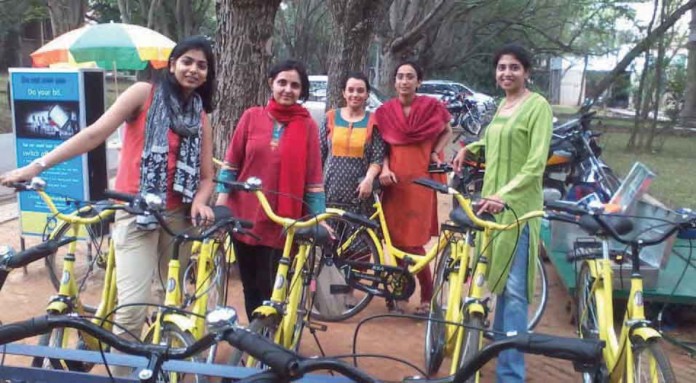By H.S. Sudhira, co-founder of Namma Cycle and Gubbi Labs.
Namma Cycle is a community bicycle sharing system. The name is inspired from ‘namma’, which means ‘ours’ in Kannada, and signifies the concept of shared ownership. Bicycle sharing is an efficient system of using a common pool of bicycles to meet short commuting needs. A pilot initiative at the Indian Institute of Science (IISc), Bangalore was launched on 6th August 2012. The initiative is going strong with more than 10,000 unique trips completed with about 40 % of the trips being made by visitors to the institute.
True to its name, namma, several players have come together to make this into reality. Ride-A-Cycle Foundation (RAC-F), the key player behind this initiative is also in-charge of running the operations. The Centre for infrastructure, Sustainable Transportation and Urban Planning (CiSTUP) at IISc has been a key anchor for this initiative. Prof. T. G. Sitharam, Chairperson, CiSTUP also chairs the Namma Cycle Board. The other key partners are Imagine Bangalore; EMBARQ India and Gubbi Labs.
The initiative was started with 150 cycles sponsored by TI Cycles India, part of the Chennai-based Muruguppa Group, and 4 bicycle station racks sponsored by BCIL, a biodiversity company based in Bangalore. This will soon be expanded to include more bicycles, stations and a wider area. The initiative received the much needed initial push from the Bruhat Bangalore Mahanagara Palike and BESCOM. Recently, Sigma-Aldrich has come forward to support this initiative.
Software support
Planning and operations design has been devised by Gubbi Labs, which has also built the software for the system that runs on a cloud-based platform. The uniqueness of this initiative is the systems flexibility to be operated both manually and automated modes. Although at IISc, there are node managers who are facilitating the sharing system manually, they are using an android-based mobile that communicates to the remote server to log the transactions and one can even find the status on number of bicycles at each station in real-time here: http://goo. gl/lXSjB. In the next versions, NFC based ids are being experimented to be issued to each registered user to access the bicycles.
Currently, users pay a nominal charge as per pricing scheme that best suits them and use the shared bicycles whenever they want to make short trips. The project works on a simple Sign-Up, Select, Ride and Return system where students can sign-up via the website and get a registration ID, select a cycle from any of the station racks, ride the cycle to their destination and return it to the nearest station.
Based on the success of the pilot, the project will be expanded to a 2 km radius around the campus to students and faculty living in the area. This then has the potential to grow into a wider network, which would involve greater partnerships with the local municipal authorities to improve road infrastructure for cyclists. With the growing concern on carbon emissions and climate change, the shared public bicycle systems are going to be the way out for short-trips. The success of Namma Cycle is best experienced when one visits the IISc campus and pedals on one these bicycles.










